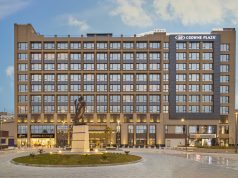What is involved in getting a huge event like GFF off the ground, and making it an international success? We ask the right person. Amal El Masri
Can you run us through your thoughts at the moment you accepted the position of Executive Director of GFF?
I have had an on-off relationship with GFF from its first edition. In the first edition, I played a role from a different seat. I was on the agency side at the time, and we were the communication partner so I was involved from day zero, in a different role. In editions two and three I was a guest, so I got to enjoy it without any responsibilities.
At the beginning of last year I was pulled in to help with the transitioning and structure of the festival under Orascom Development, a role I took on around February or March of 2020. At that point we had started seeing Covid-19 but could not have imagined what the rest of the year would be like. Having said that, we are extremely proud of the fact that we were able to pull GFF off, as a physical festival.
On the outside, we think overall that it did very well. Internally, we knew what we wanted to do in last year’s plan, and we were not able to manage this due to last-minute approvals, so this year I did commit to take on the role of Executive Director, and hopefully, I will be able to implement what we had in mind for last year.
What does your role in GFF involve?
My role involves the organizational, non-cinematic side of the festival. Obviously, we have a very strong cinematic team under the leadership of Intishal Al Timimi, our Festival Director. On the organizational side, it’s a beautiful gig. Amal El Masri
It’s all the way from the strategic and business planning of the festival and its future, to the positioning and the key pillars that we think will support the festival, through to the organization and implementation of its different elements like marketing, partnerships, the sort of content and communication that we want to create, with a focus on international markets as well as the local Egyptian and regional markets.
What have the past 12 months been filled with, in terms of conceptualization and organization?
Earlier, I mentioned the challenges of last year. However, even with these challenges, I think 2020 was a very interesting year to experience, and come up with some concepts of how to take this festival forward.
As you know, last year was the first year for us to move the location, from the Marina Theater to the Festival Plaza at the GCCC, and that allowed us to experiment with a lot of things. We were able to create a hub, or central area for the festival, not just a theater. The things we tried gave us a lot of potential to build on this year.
We tried to incorporate in the same hub the after-celebrations for the ceremonies and the marketplace for our partners. We also created the sunset networking sessions, at the Plaza. This has got us quite excited about how to grow the whole experience of the festival, so this year I think what we are looking at is the evolution of elements, the things that were working well we are building on further.
We also started introducing paid registration last year, which will enable us to grow a general audience for the festival. This is an area that is super important for us to be building on. We will always have our invited guests, and our VIP guests, but to offer space to grow the general audience is a focus for us.
What makes GFF unique?
While I think all festivals have a similar role in supporting the film industry, I think GFF is blessed with a combination of pillars not many festivals have the benefit of. The programming, and also the Cinema for Humanity Platform, finds the power of connection through films addressing humanitarian issues for our region. Amal El Masri
This takes our role further than just the film industry. Of course, the destination offers so much. It is a perfect time to host a film festival by the sea, which makes it so unique. And, the broader cultural agenda of El Gouna, starting with the GCCC, our immense new home.
What role has GFF had in encouraging cultural activity in Egypt?
I believe that GFF has played a very big role in the momentum of Egypt, whether culturally or touristically, creating modern, world-class internationally-covered cultural events. Together with GFF we see others popping up all over Egypt.
The importance of these events on a local level is that they portray a fresh, young creative side of Egypt, rather than the staid expected tourism that we see every day. I think that the festival plays a very important role in that.
What do you envision in upcoming editions?
In terms of upcoming editions, I have to say that ever since I joined the team the thing that I hear from everybody is, “This festival was born big”, which is true. It is a film festival which technically is very young, at five years, but from year one, it was on its feet with big productions, big programming and big attendance.
Moving forward, I think the more the festival matures, and we are seeing that already, the better the global awareness is in the industry. I believe our team feels that now when they travel to other festivals. El Gouna is on the map. It has a very respected reputation, thanks to the richness of its programming. When that momentum increases, both sides of the festival get to benefit. Amal El Masri
The industry side gets to benefit by the festival becoming more of a magnet for industry support, and as a general experience, it is important to grow the audience and have a wider footprint, attracting people who fly in, looking for a great cinematic experience and an amazing week on the Red Sea.





